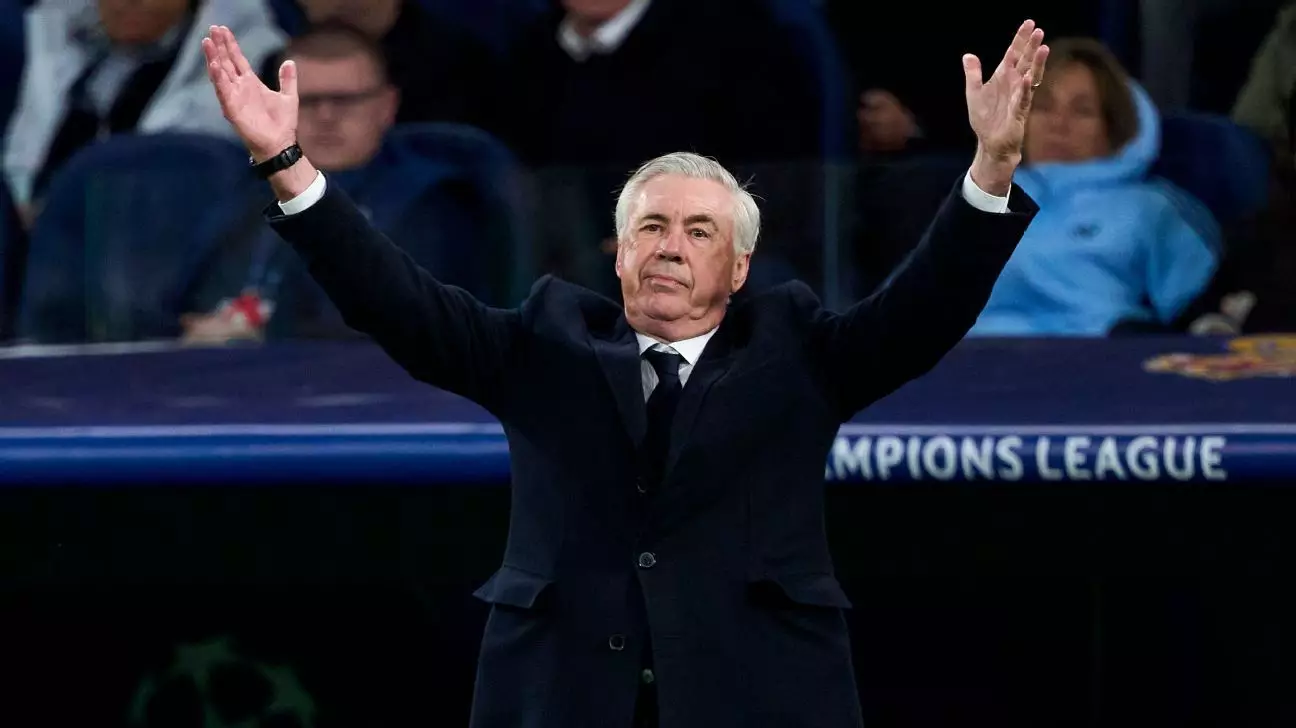The recent Champions League quarterfinal clash saw Real Madrid suffer a heart-wrenching 2-1 defeat against Arsenal, summarily ending their reign as champions. For Carlo Ancelotti, this defeat not only casts a shadow on his tactical decisions but also raises questions about his tenure at one of football’s most prestigious clubs. In a season where high expectations followed the team, such an exit is unforgiving. The match at the Santiago Bernabéu did not just represent a failure in Europe; it unveiled a larger narrative about the vulnerabilities of a team renowned for its resilience.
In this particular match, pivotal moments dictated the outcome. Arsenal’s Bukayo Saka, having a penalty saved early on, eventually found a way to score in the 65th minute, demonstrating resilience that contrasted starkly with Madrid’s erratic performance. Following a glimmer of hope provided by Vinícius Júnior’s equalizer, the team ultimately succumbed to the relentless pressure of Gabriel Martinelli’s late goal, confirming their 5-1 aggregate elimination. Such dynamics unfold intricately in the world of football—where momentum can shift within seconds, and where a team’s psychological fortitude often proves more crucial than raw talent.
Ancelotti’s Dilemma
Ancelotti faced the scrutiny that any high-profile manager would endure after such a loss. Speaking to the media, he projected a blend of humility and uncertainty regarding his future, acknowledging the reality that a club of Madrid’s stature may opt for change. With his contract valid until 2026, these reflections complicate the narrative; Ancelotti is not a lone wolf, but rather part of a complex ecosystem that includes club politics, fan expectations, and the ever-looming pressures of high-stakes football.
Instead of truly addressing tactical failings, he hinted at the potential of a future without him—possibly indicating that he feels the weight of criticism and recognizes the urgency to improve. The revelation that Ancelotti has not contemplated resignation may either indicate confidence or stubbornness, but either way, it places the burden of performance squarely on both his shoulders and the players’.
Courtois’s Call for Collective Responsibility
Thibaut Courtois, Madrid’s goalkeeper and an essential player in high-pressure games, stepped forward post-match to emphasize the need for self-analysis within the squad. His comments suggest a growing recognition among the players themselves about their collective responsibility. In his reflections, he pointed out that players must prioritize collaboration over individual brilliance, highlighting a critical flaw in Madrid’s recent performances. Courtois acknowledged that Madrid’s creative talents can be easily neutralized if opposing defenses double-mark key players.
What resonates in Courtois’s statements is the need for unity—an aspect crucial in turning around their season. The absence of a reliable center forward, as he noted regarding the departure of Joselu, has created a tactical conundrum. The relentless crosses from the wings are futile without someone to convert them. Such observations reflect a fundamental understanding among the players about their diminishing attacking efficacy—one that can no longer be ignored.
The Road Ahead: Reassessing the Season
As Madrid prepares to face Athletic Club in LaLiga, followed by pivotal clashes against Getafe and Barcelona, there lies an opportunity for redemption. The route may appear daunting, especially with mounting pressure and criticism, but within lies the chance to address internal issues and recalibrate the team’s ethos. The Copa del Rey final can revive ambitions, yet it demands more than mere talent; it requires the players to embody a collective spirit that has occasionally been absent.
In such pivotal moments, coaching decisions and player synergy will dictate the outcome of not just games, but the future trajectory of this storied club. Ancelotti must not only adapt tactically but also inspire a rekindling of the winning mentality that has defined Madrid’s identity. If the current squad draws from their setbacks and evolves—particularly in terms of teamwork and strategy—there exists hope for re-establishing dominance on both domestic and continental fronts.
Ultimately, as the tension mounts, it is this resilience and willingness to confront their shortcomings that could define not just this season, but potentially the legacies of both players and manager alike. The allure of football lies in its unpredictability; thus, while defeat may sting, it also offers an opportunity for transformation.

